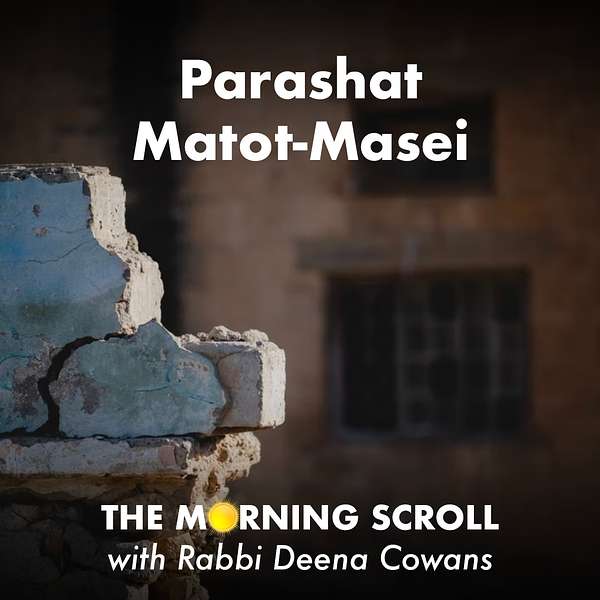
The Morning Scroll
The Morning Scroll
Parashat Matot-Masei
Use Left/Right to seek, Home/End to jump to start or end. Hold shift to jump forward or backward.
This week's parsha was hard to read. And judging by some telling word choice in the Hebrew text, it was hard to write, too.
Produced by Mishkan Chicago. Music composed, produced, and performed by Kalman Strauss. See our upcoming Shabbat services and programs here, and follow us on Instagram and like us on Facebook for more updates. Check out Shabbat Replay on Contact Chai for more from Rabbi Deena.
Welcome to The Morning Scroll! I'm Rabbi Deena Cowans from Mishkan Chicago and you're listening to what will be a quick dive into this week's parsha. If you’ve been meaning to brush up on your Jewish literacy, or you’re looking for some inspiration, you’ve come to the right place. This week, we read Parashat Matot-Masei, a double portion and the last in the book of Bamidbar. We’ll start with a brief recap:
There’s a bunch of laws about making vows and how to get out of them, and then the Israelites are commanded to kill all the Midianites. Which they do, except they don’t kill ALL the Midianites, just the men. Moses is like, REALLY pissed about this, since the women were the ones who seduced the Israelites. The soldiers are purified after their encounter with corpses, and then the spoils of the war are divided in half, with one half being split evenly between the 12,000 soldiers, and the other half split evenly between the rest of the people. The officers do a count and realize not one soldier was killed, so they voluntarily offer up a bunch of jewelry as a thanks to God. The tribes of Reuben, Gad and half of Menashe realize they like it on this side of the Jordan, and ask Moshe to ask God if they can stay there. Moshe doesn’t love the idea, but agrees as long as they accompany the rest of the tribes into the land of Israel to help them fight. The Torah shifts into a travelog, telling us all the places the Israelites camped over the last 40 years. God tells them to kill all the Canaanites and destroy their idols, and then gives the borders for the portions, which are to be assigned by lottery. The Levites must also receive 48 cities to live in, since they don’t get a portion of the land, and 6 of these 48 will be cities of refuge for a person who accidentally kills another. The parsha, and book, ends with a law that the daughters of Zelopechad, who we met a few weeks ago when they petitioned to receive their father’s portion of land because he had died with no sons, must marry within their tribe so the land doesn’t leave their tribe.
This is one of those parshas that makes me really uncomfortable, because it talks about humans, specifically women who are virgins, as “spoils of war” who get divided between the priests, soldiers and rest of the people. It reminds me of a West Wing episode where one of the main characters, Leo, is arguing with a general about the US joining the war crimes treaty at the UN. The general finally shares with Leo that when Leo was a soldier in the Vietnam war, he flew a mission that he thought was to take out a military target, but actually killed civilians. “Why would you tell me that?!” Leo asks, horrified. “All wars are crimes,” the general replies.
So sure, this war that the Israelites fought against Midian was commanded by God. But killing or enslaving other people is a crime, period. And it seems like the Torah sort of agrees. Every time it refers to these women who were captured, it calls them “Nefesh Adam”, which literally means “breathing” or “soul” humans. It’s a deeply empathic way to refer to people, especially while discussing how to treat them as chattel. I would like to think that using these words to refer to the captured Midianite women is the Torah’s way of reminding the Israelites, and us, that all war is a crime, and that humans are humans regardless of where they come from or who their people are.
So this week, I want to offer a blessing to these Midianite women, who have watched their families be killed in a war, and their homes burned, only to be brought to the camp of their captors and parceled out. I hope that they found themselves in homes that recognized their trauma and their humanity. And, instead of turning this blessing to you, listener, I want to use this as a chance to recognize the estimated 25 million people who are victims of human trafficking. I hope we use this parsha to learn more about trafficking, how to recognize it and how to build more safety for vulnerable people.